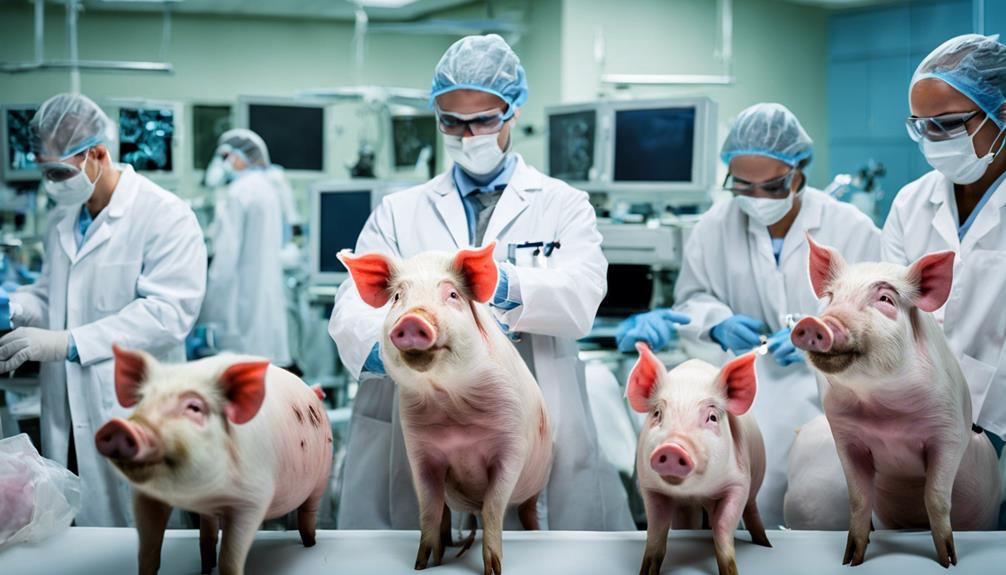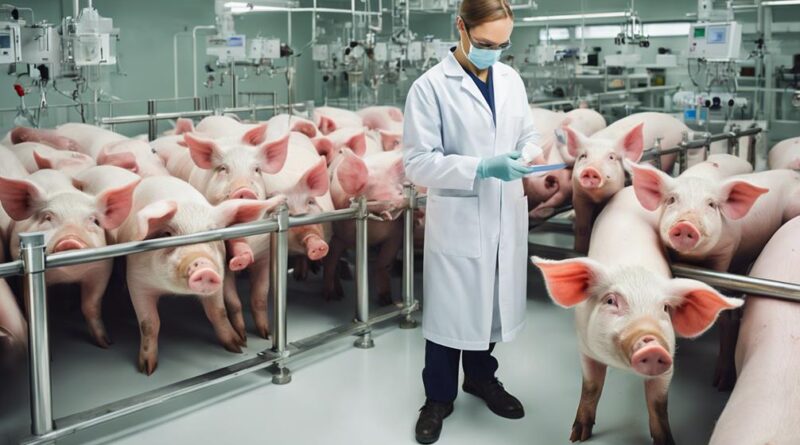How Pigs Serve as Vital Research Model Organisms
When considering the intricate world of research model organisms, it's worth noting the understated but crucial role that pigs play in advancing scientific knowledge. Their significance extends beyond mere livestock status, offering a unique perspective that parallels human biology in various ways.
From genetic similarities to physiological relevance, pigs stand at the forefront of groundbreaking research endeavors that hold promise for diverse fields. Stay tuned to uncover how these intelligent creatures are shaping the future of scientific exploration and innovation in ways that may surprise you.
Importance of Pigs in Research
Highlighting its versatility and genetic similarity to humans, pigs play a crucial role in biomedical research. In reproductive studies, pigs are valuable due to their similarities to humans in reproductive physiology and anatomy. Their reproductive system closely resembles that of humans, making them ideal for studying fertility, pregnancy, and reproductive disorders. Pigs also exhibit a similar immune response to humans, aiding in the development of vaccines and treatments for various diseases.
Behavior research involving pigs provides insight into social interactions, cognition, and emotional responses. Their complex social structures and behaviors can be studied to gain a better understanding of human behavior, mental health, and neurobiology. Observing how pigs react to different stimuli and environments can help researchers draw parallels to human behavior and improve mental health treatments.
Furthermore, pigs' environmental impact is a crucial aspect of research. Studying their environmental interactions, such as diet, waste management, and habitat preferences, can help in sustainable agriculture practices and environmental conservation efforts. By understanding how pigs interact with their surroundings, researchers can develop more eco-friendly farming methods and contribute to environmental sustainability.
Genetic Similarities With Humans
Pigs' genetic similarities to humans make them a valuable research model for studying various human-related aspects. When it comes to genetic comparisons, pigs offer a unique advantage due to their genetic makeup bearing significant resemblance to that of humans. This similarity has paved the way for numerous medical breakthroughs and insights into human health and diseases.
- Genetic Overlaps: Pigs share a strikingly similar genetic makeup with humans, particularly in key areas related to disease susceptibility and immune responses.
- Disease Research: Studying pigs can help researchers better understand genetic factors contributing to diseases common to both pigs and humans, such as cardiovascular diseases and certain types of cancer.
- Drug Development: Pigs serve as an ideal model for testing new drugs and treatments due to their genetic proximity to humans, aiding in the development of effective medications.
- Precision Medicine: By leveraging pigs' genetic similarities with humans, scientists can tailor medical treatments more precisely, leading to personalized healthcare solutions that are more effective.
These genetic parallels between pigs and humans not only enhance our understanding of human biology but also accelerate the pace of medical advancements and breakthroughs that benefit both species.
Pigs' Physiological Relevance
Exploring the physiological relevance of pigs in research reveals their crucial role in advancing our understanding of various biological processes. Pigs have a high degree of similarity to humans in terms of metabolic function, making them valuable models for studying metabolic disorders and processes. Their digestive system, liver function, and overall metabolism closely resemble those of humans, allowing researchers to investigate conditions such as obesity, diabetes, and metabolic syndrome with more accuracy.
When it comes to the cardiovascular system, pigs provide a model that closely resembles human cardiac anatomy and physiology. Their heart size, blood pressure regulation, and response to cardiovascular medications are comparable to humans, making them instrumental in cardiovascular research. Studying cardiovascular diseases like hypertension, atherosclerosis, and heart failure in pigs helps in developing new treatments and understanding disease mechanisms more effectively.
Pigs in Drug Development
In drug development, pigs play a crucial role as reliable models due to their physiological similarities to humans, particularly in metabolic and cardiovascular research areas. Pigs are extensively used in drug development for various purposes, including drug efficacy and toxicity testing. Here's why pigs are indispensable in this field:
- Drug Efficacy Testing: Pigs provide valuable insights into how drugs may work in humans. Their similar anatomy and physiology make them ideal for assessing the effectiveness of new medications.
- Toxicity Testing: Pigs help researchers understand how a drug may be metabolized in the body and whether it could lead to harmful side effects. This information is crucial in ensuring the safety of pharmaceutical products.
- Preclinical Trials: Pigs are used in preclinical trials to evaluate the pharmacokinetics of drugs, which involves studying how drugs are absorbed, distributed, metabolized, and excreted in the body. This data helps predict how a drug will behave in human trials.
- Pharmacokinetics: Studying drug behavior in pigs aids in determining the optimal dosage and dosing intervals for human patients. Pigs' physiological similarities to humans make them reliable models for pharmacokinetic studies.
Pigs for Disease Studies
With their physiological similarities to humans, pigs are instrumental in conducting studies on various diseases. Pigs have an immune response that closely resembles that of humans, making them invaluable for researching diseases. When studying diseases in pigs, researchers can observe how the immune system reacts to pathogens, vaccines, or other treatment methods. This similarity in immune response allows for a more accurate representation of how diseases may affect humans.
Additionally, pigs are used to study disease progression. By infecting pigs with specific pathogens, researchers can monitor the development of diseases over time. This provides crucial insights into the different stages of a disease, its effects on the body, and potential treatment options. For diseases that have a similar progression in pigs and humans, such as certain respiratory illnesses, studying these models can lead to advancements in medical interventions.
Advantages Over Other Models
Pigs offer distinct advantages over other research models due to their physiological similarities to humans and their relevance in disease studies. When considering the use of pigs in research, there are several key advantages that make them stand out:
- Comparative studies: Pigs share many anatomical and physiological similarities with humans, making them excellent models for comparative studies. This similarity allows researchers to draw more accurate conclusions about human biology and disease processes.
- Genetic variations: Pigs exhibit genetic variations similar to those found in humans, providing a valuable resource for studying the genetic basis of diseases. These variations can help researchers better understand the complexities of certain conditions and develop targeted treatments.
- Model validation: Pigs are widely accepted as reliable models for various diseases, thanks to their physiological resemblance to humans. Their use in research allows for the validation of experimental models and the replication of disease conditions seen in human patients.
- Experimental design: The size and structure of pig organs closely resemble those of humans, making pigs ideal for experimental design in biomedical research. This similarity allows researchers to conduct experiments that are more translatable to human patients, improving the overall efficacy of preclinical studies.
Pigs in Organ Transplant Research

When exploring advancements in organ transplant research, the utilization of pigs as model organisms plays a pivotal role in understanding transplant immunology and improving transplant outcomes. Pigs have proven to be valuable in studying immune responses and tissue compatibility in organ transplantation.
In organ transplant research, understanding the immune response is crucial to prevent rejection of the transplanted organ. Pigs share similarities with humans in their immune systems, making them ideal for studying immune reactions to transplanted tissues. By studying how pigs' immune systems respond to foreign organs, researchers can gain insights that can be applied to improve transplant success rates in humans.
Moreover, pigs are used to assess tissue compatibility between the donor and recipient. Tissue compatibility is essential to prevent the recipient's immune system from attacking the transplanted organ. Pigs help researchers study the factors that influence tissue compatibility, such as blood type matching and histocompatibility. This knowledge is vital for developing strategies to match organs more effectively and reduce the risk of rejection in human organ transplant recipients.
Future Applications and Innovations
In future applications and innovations, researchers are poised to revolutionize organ transplant procedures by leveraging insights gained from studying pigs' immune responses and tissue compatibility. By harnessing the knowledge acquired through pig research, exciting advancements are on the horizon that could significantly impact medical practices worldwide.
- Ethical Considerations: As researchers delve deeper into using pigs for organ transplant research, ethical considerations surrounding the breeding and use of these animals will come into sharper focus. Striking a balance between scientific progress and ethical treatment of research subjects will be paramount.
- Scientific Breakthroughs: The comprehensive understanding of pigs' immune systems and tissue compatibility may lead to groundbreaking discoveries in organ transplantation. These breakthroughs could pave the way for more successful transplant outcomes and increased donor availability.
- Public Perception: How the public perceives the use of pigs in research, particularly in the context of organ transplants, will shape future developments in the field. Educating the public about the benefits and ethical considerations involved will be crucial.
- Regulatory Challenges: Navigating the regulatory landscape to translate research findings into clinical applications will present challenges. Overcoming regulatory hurdles and ensuring safety and efficacy will be key priorities for researchers and policymakers alike.
Frequently Asked Questions
What Are Some Ethical Considerations When Using Pigs as Research Model Organisms?
When considering ethical considerations in research involving pigs, it's crucial to prioritize animal welfare. Ensuring that the pigs are treated humanely throughout the research process is essential. This includes providing proper housing, nutrition, and veterinary care.
Additionally, researchers must adhere to strict ethical guidelines to minimize any potential harm or distress to the pigs involved in the study. Ethical considerations are paramount when using pigs as research model organisms.
How Do Researchers Ensure the Well-Being and Welfare of Pigs During Experiments?
To ensure the well-being and welfare of pigs during experiments, researchers focus on animal enrichment and behavioral monitoring. Providing a stimulating environment with toys, social interaction, and varied diets enriches their lives.
Regular observation and recording of behaviors help researchers assess their overall health and happiness. By incorporating these practices, researchers can maintain the high standards of care necessary for the ethical treatment of research animals like pigs.
Are There Any Specific Regulations or Guidelines in Place for Using Pigs in Research Studies?
To ensure regulatory compliance and uphold animal welfare standards, specific guidelines govern the use of pigs in research studies. These regulations aim to safeguard the well-being of the animals involved and ensure ethical treatment throughout the experimental process.
How Do Researchers Control Variables Such as Diet and Environment When Studying Pigs?
When studying pigs, researchers control variables like diet and environment by using genetic modifications and behavior monitoring. They implement environmental enrichment to ensure the pigs' well-being and simulate natural conditions.
Feeding schedules are carefully regulated to maintain consistency across experiments. By manipulating these factors, researchers can observe how changes impact the pigs' health and behavior, providing valuable insights for various research studies.
How Do Pigs' Social Behaviors and Interactions Impact Research Outcomes?
When studying pigs, understanding their social dynamics is crucial. Group interactions can greatly influence research outcomes in behavior studies.
Conclusion
In conclusion, pigs play a crucial role in research as vital model organisms due to their genetic similarities with humans, physiological relevance, and applications in drug development and disease studies. Their advantages over other models make them an invaluable resource for advancing medical science.
With ongoing advancements in organ transplant research and potential future innovations, pigs continue to be instrumental in furthering our understanding of human health and disease.
